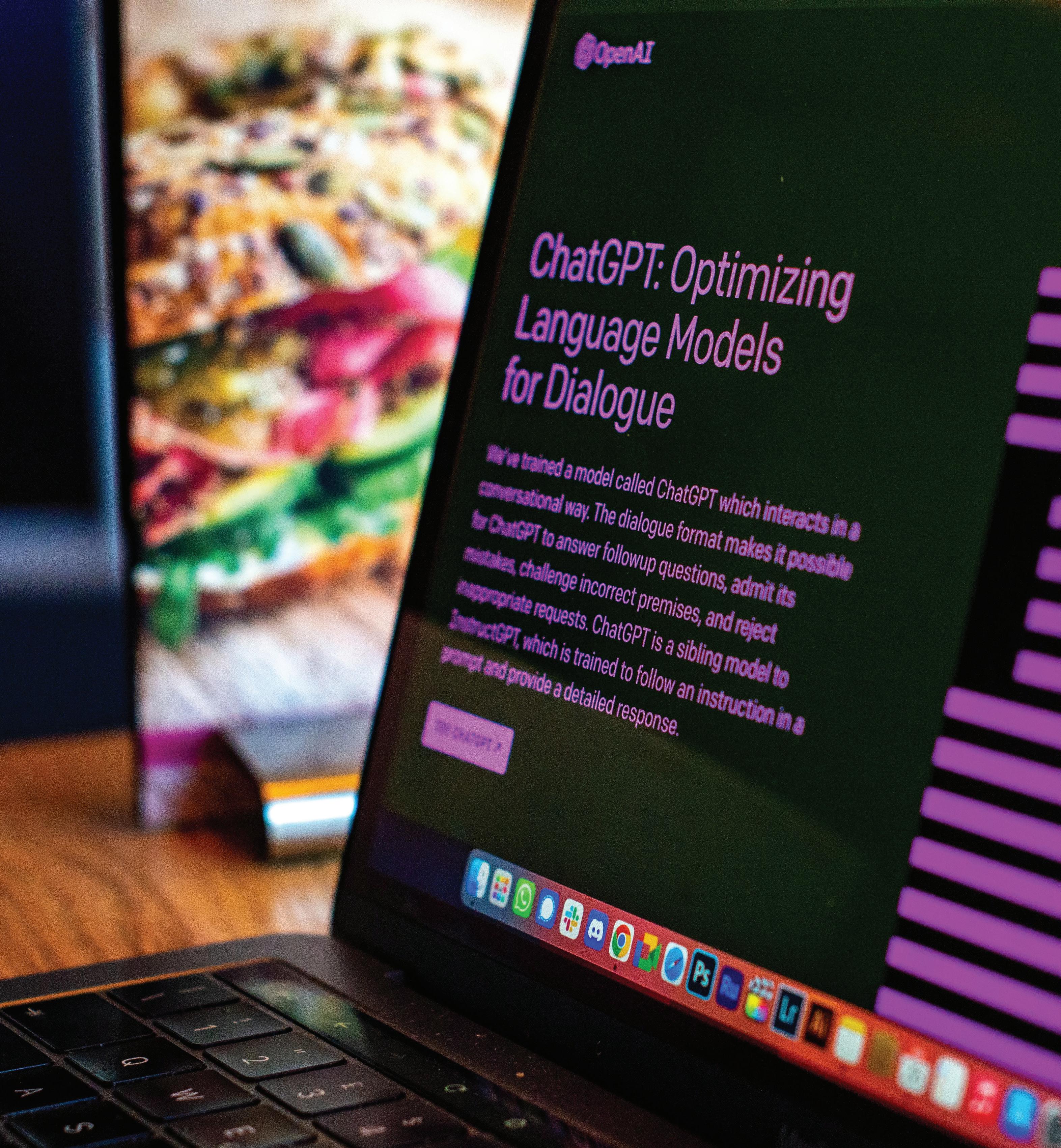
5 minute read
Content Catfishing: Why AI Adoption Makes Human Interaction More Necessary (Not Less)
Katy Holmes, General Manager British Business Group Dubai and Northern Emirates
In today’s fast-paced and technology-driven world, businesses are constantly seeking innovative ways to stay ahead of the competition. The integration of artificial intelligence (AI) into business operations has been truly revolutionary.
It has transformed the way businesses operate, optimising processes and boosting productivity - with an average 14% boost in issues resolved per hour, according to the National Bureau of Economic Research.
AI-powered algorithms can analyse vast amounts of data, predict trends, and streamline decisionmaking, leading to more efficient outcomes.
Even simple task-related questions are now being answered by AI chatbots like ChatGPT, which are gradually replacing search platforms like Google.
AI chatbots and virtual assistants have become commonplace, offering instant and personalised customer support, which has greatly enhanced user experiences in most cases.
AI has proven its value by automating mundane tasks and creating engaging written introductions, demonstrating its time-saving potential.

However, in the quest for efficiency and automation, some businesses have fallen into the trap of “content catfishing” - leveraging AI-generated content to create remarkable online first impressions, fully aware that reality may fall short of expectations in person.
Akin to online dating – the only way we can really know and trust the level of expertise of our stakeholders, partners, and colleagues is through meeting in person - through first-hand practical experience.
Having thought long and hard about the impact of AI on copywriting, this doubt and lack of trust has even filtered into my personal life – as I found myself questioning the authenticity of my 12 year old daughter’s school poetry!

Listening to my daughter read her poem to me, an initial feeling of pride was quickly overshadowed by doubt. Suspicion crept in and I doubted its originality! I quickly demonstrated ChatGPT to her, and it was clear that she did not know how to curate content with AI – which she does now. Shame on me!
I strongly believe that while AI has many benefits, businesses must exercise caution and ethical responsibility when using this technology.
Companies that use AI to write compelling introductions, to lure customers in with captivating promises and perfectly written, personalised communications, need to be very careful.
Disappointed customers realise that the company they had hoped to work with, was little more than an AI-fueled mirage. Customers can feel misled or deceived.
This can be especially damaging in Dubai, where the relatively small market size puts extra emphasis on your reputation.
Rebuilding trust with clients after a negative experience can be incredibly challenging. And the effects can be far-reaching. Not only can it ruin the offending brand’s reputation, but the misuse of AI can negatively impact other service providers as well.
Instead of relying solely on AI-generated content, businesses should identify use cases where AI can complement human efforts. For example, AI can automate routine tasks, freeing up employees to concentrate on more complex and creative work.
While AI can aid in personalisation, genuine connections with customers often require human interactions. Train employees to provide personalised services, to actively listen to customers, and empathise with their needs.

Businesses should always maintain the quality of customer experience. Utilise AI to enhance customer support and service, but ensure that human intervention is readily available when required.
Be upfront about the use of AIgenerated content in customer interactions. Customers appreciate transparency, and honest communication builds trust.
The UAE being such a melting pot of culture, language, and diversity, I do recognise the potential ChatGPT has, especially for smaller companies that wish to appear proficient in their business communications.
First impressions are so important and that initial email has powerful implications.
I can share a recent example of a BBG stakeholder who is undoubtedly good at what they do. But, by their own admission, their written English is weaker than their competitors.
We have a long-standing working relationship and I was impressed when I received a press release to announce a recent development. My first thought was that they had hired a PR agency, because of the quality of the content and the way it was structured.
I was corrected (with absolute honesty) by this person, who shared that they had used AI to write the press release –specifically ChatGPT!
As we already had a long-term business relationship, I was positive in my response. But had this been at the start of the business relationship, would I then have trust issues around their overall competencies? Probably, yes!
In the pursuit of growth, companies must remember to maintain a balance between human and technical resources. Only by incorporating AI into business strategies, while preserving genuine human connections, can companies achieve sustainable growth and build strong, lasting relationships with their customers.
AI undoubtedly has immense potential to transform the way businesses operate. But it should be used responsibly and ethically. Content catfishing may yield short-term gains – but ultimately it undermines customer trust and loyalty.
I personally could live without self-checkout kiosks!

And instead of hiding our use of this time-saving tool, why not embrace it transparently? That would go some way to preserving and fostering trust. In that spirit of ‘transparency in communication’, this article was first drafted using ChatGPT, in collaboration with a BBG Member PR firm.
We based this article on the term I was using regularly myself: ‘content catfishing’. I then reviewed and personalised it myself! Did it save me time? A little. Did I feel entirely comfortable through the process? Not really! The end result is still 85% me.








